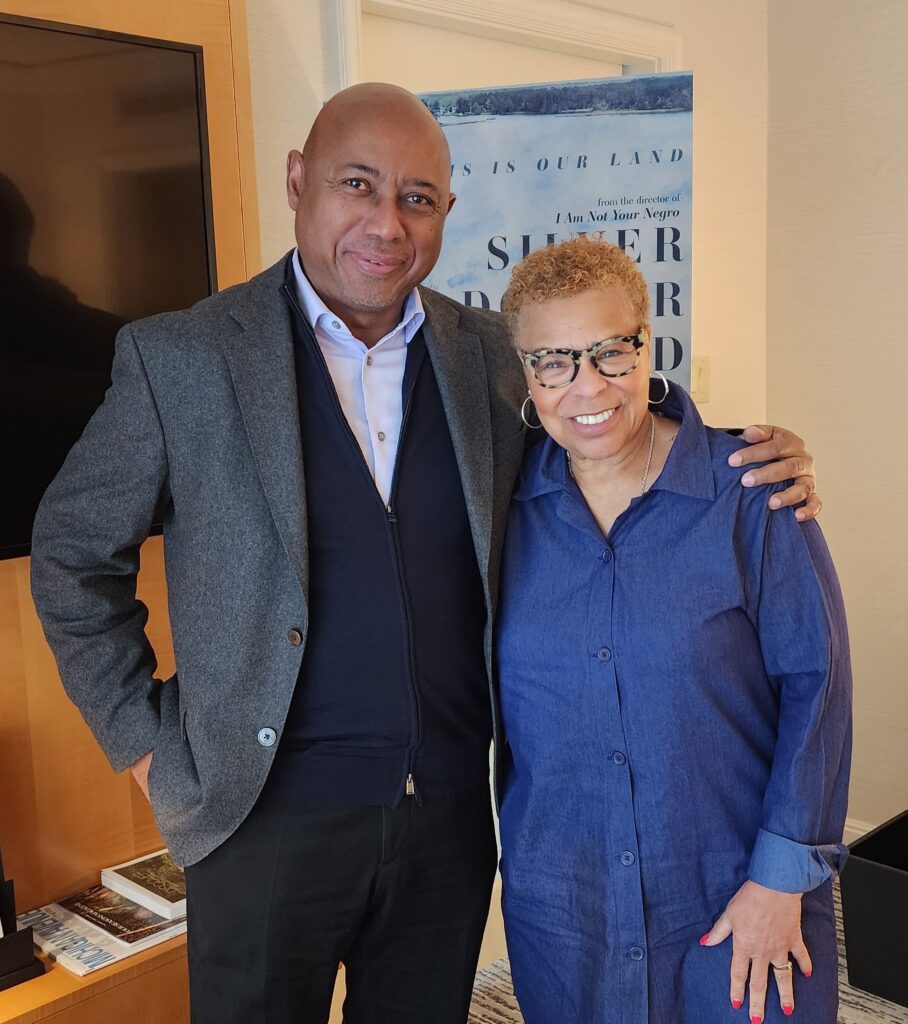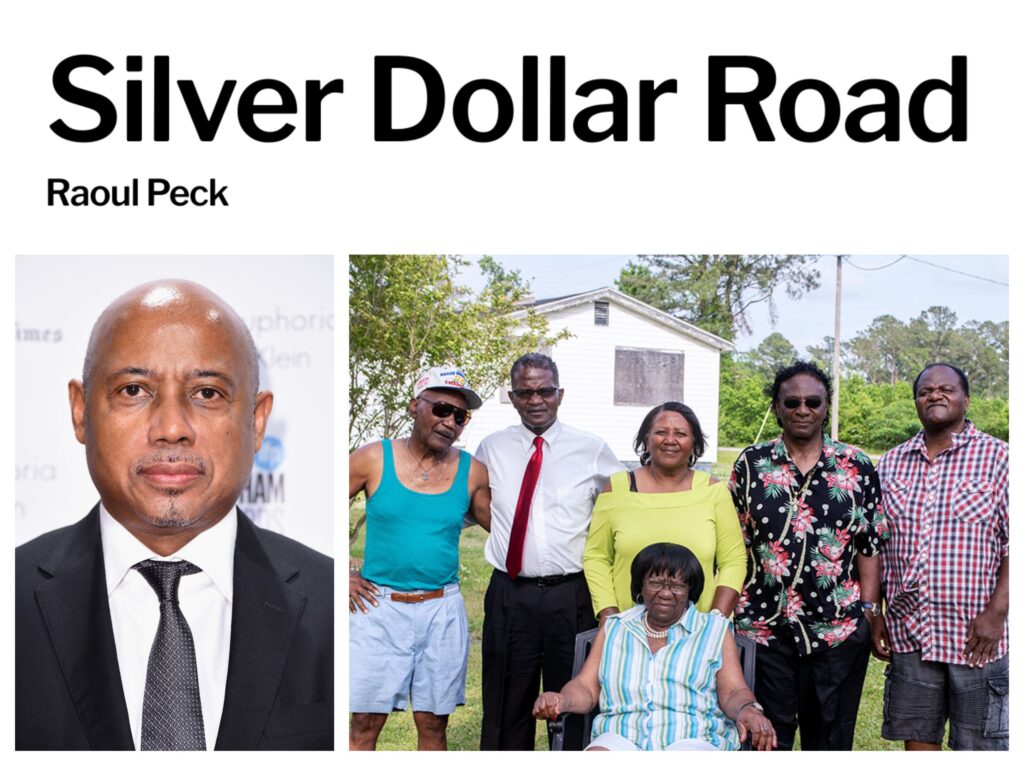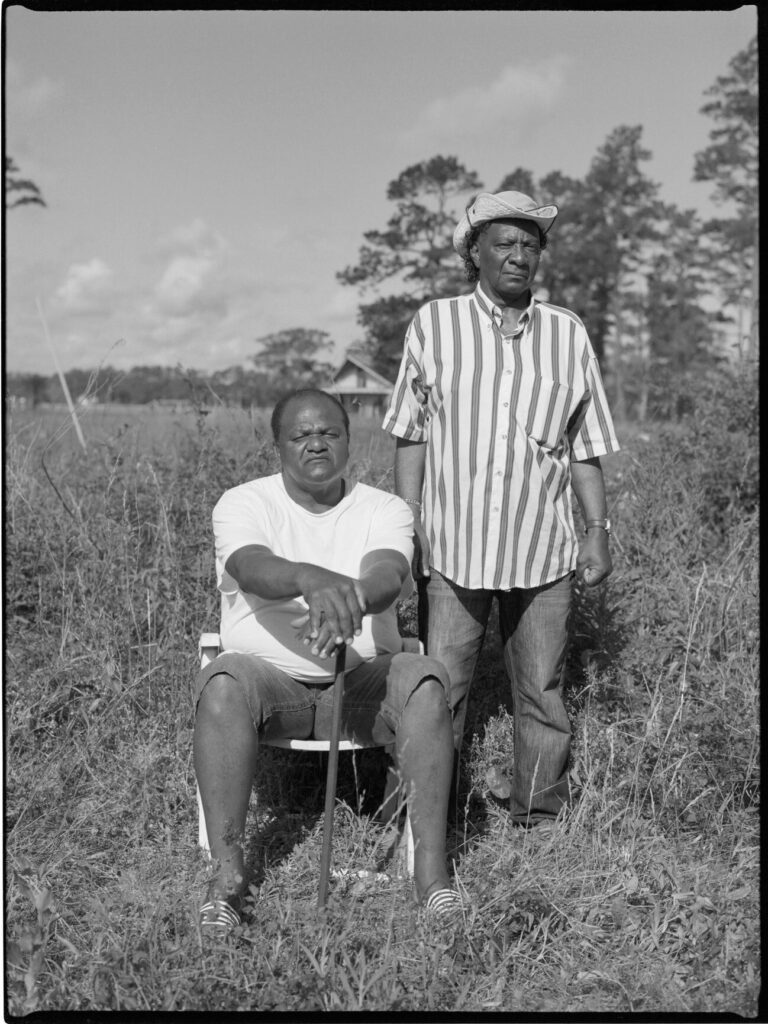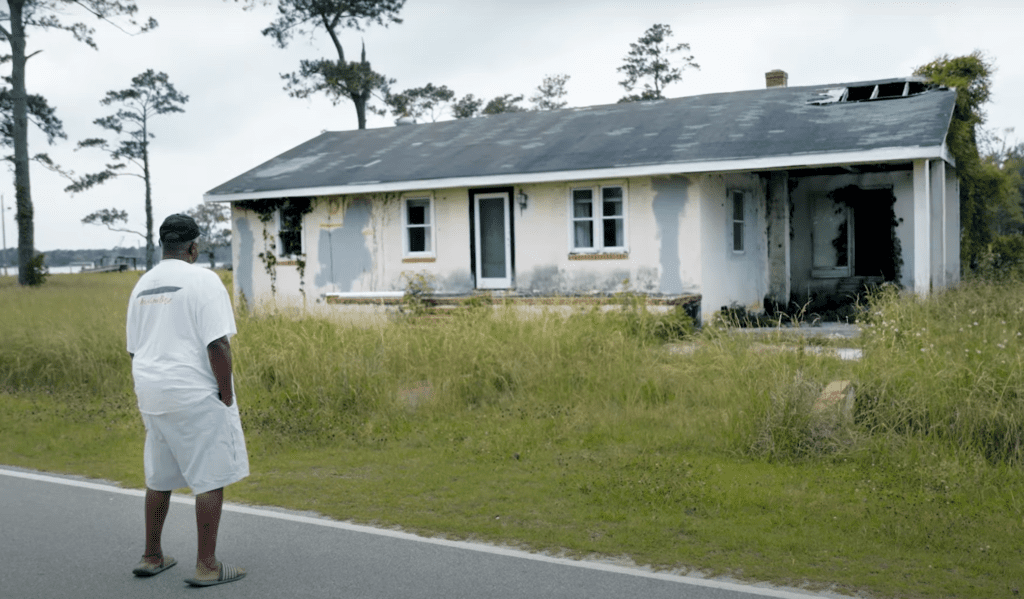A Bonnie’s Eye Conversation with the Director of “Silver Dollar Road,” Raoul Peck

Director Raoul Peck and Bonnie DeShong
I was first introduced to the film SILVER DOLLAR ROAD at the Chicago International Film Festival. It was a part of the Black Perspective series. Director Raoul Peck (I AM NOT THAT NEGRO) was in town for the festival I had the honor of sitting down and speaking to him.
Below is our conversation in its entirety.
Bonnie DeShong :
I saw the film Silver Dollar Road. It brought me to tears. My family’s from a small town in Tennessee called McLemoresville, Tennessee, and we had heirs’ property, but we were blessed that we were able to sell it to our cousin and keep it in the family. When I was watching Silver Dollar Road, my heart just broke for this family. So I don’t want to tell my listeners and readers about it. I want you to tell from your heart about the story of Silver Dollar Road.
Raoul Peck:
Well, whatever everybody says, we all come from land from somewhere. Either it’s the one generation before or three generations before, but we come from somewhere. And what happened is that sometimes it had been so traumatic that we don’t speak about it. Your grandparents eventually or your parents don’t speak about it. And that’s the experience I’m doing right now with a lot of people I met after screenings, is that they realize that they have a similar story in their family. And so the Reels family story is, can you imagine you’ve been born on the land, you grew up there, your grandparents were born there, you have children there and suddenly people are coming and trying to seize part of that property? And unfortunately, the legal system and the complication of this legal system, which is built not to help poor landowners keep their land, but to help speculators to buy your land or to steal your land.
And that’s unfortunately ingrained in the whole history of this country. So what makes the Reel family even more poignant is that the two brothers, Melvin and Licurtis, who also were born on that piece of land, have their two houses on the waterfront, on the waterside, which is the prime land that speculators wanted to buy. And to have to buy a story that started in the 1970s where another person in the family that didn’t even live there asked for this particular part of land saying that he inherited it, which he came with a fraudulent title. Again, that happened in many families, especially after the death of the patriarch or matriarch, all sorts of things come up. But in that case, that was particularly hard because most people didn’t really know him. And that’s the problem with heirs property. After one or two generations, you have 100, 200 inheritance who could pretend to have a piece of that land.

It’s like it’s the whole family and descendants are the shareholders somehow and legally they could come back and ask for part of it. But what is weird is that they are not the ones taking care of the land. Land, you have to take care of it. And you have to pay taxes. So you can’t pretend to have lived 20, 30, 40 years abroad or somewhere, never have spent a penny to make sure that you pay your taxes every year and pretend that now you want my share. Unfortunately, the laws allow what you call petition laws or petition action, Torrance law, all those laws that speculators know very well how to use, and landowner, unfortunately, less. And even the fact that a family can leave their land for all their descendants thinking that it’s protected and it falls on the heirs’ property. But in fact, heir property doesn’t give you any legal paper.
Bonnie DeShong :
No, it doesn’t.
Raoul Peck:
It’s just a status. So that means you don’t have access to any government help. If there is any natural catastrophe, you don’t get money to rebuild. If there is any kind of project you want to develop, you cannot get a mortgage on that land because, in regard to the law, you don’t exist. So it makes everything very complicated. And so anybody can come from outward and say, “Yeah, I’ve been there for this long. Here are the names of people who can witness that I was there or that I was promised that particular piece.” And that’s what this relative did even though the family by then had a paper that legally said Gertrude Reels was the custodian of the land.
The criminal decided to ignore that piece of paper. And so you have now two judgments that are totally contradictory and that started the whole fight.
Bonnie DeShong :
What got me too was that number one, a relative would do this, but trust me, going through different deaths and wills and whatever, relatives can get really ugly when they think that they want something.
Raoul Peck:
Well, in that case, the relative (the one who had no real right to the land) sells it to another person who sells it to a business and to another company. So you have many entities who bought the land, and the last person who owned it, didn’t even come to the place, he never saw the piece of land. He bought it as an investment from far away. So that person had even less incentive to find some sort of solution. Except, at one point he did offer to sell it back for $300,000, but the family did not have that kind of money.
Bonnie DeShong :
That was the thing that got me too. It was like, okay, these huge corporations buy this land and they want to develop it for beach property and all of this other stuff, and then somebody else gets it and it’s just land laying there when these people have had and worked this land. The one brother that had his boating business had built so much and had his wharf and went out shrimping and everything and making their living from this land for years. This is in North Carolina, correct?
Raoul Peck:
Yes, yes.
Bonnie DeShong :
And so it really brought me to tears, especially when the brothers said they’re not moving. They’re arrested and are in prison for seven years. How can you be in prison for seven years?
Raoul Peck:
That’s the scandal. And that’s where the racism comes in as well. The last lawyer who finally got them out without saying it like this, but he said that’s the elephant in the room because there were other ways to settle the case. Even they could have said, “Okay, we are going to destroy the house ourselves. We are going to put walls around and we are going to bill the brothers.” They didn’t do that. The judges really wanted to punish them and give them a lesson that they could not defy the court. That’s a contempt charge, but you don’t go to prison for almost eight years because of contempt. There is something else behind that. So that’s what I think enraged people. It’s the injustice of that. And basically the… How do I put it?
There was no necessity for what resulted. You’re not going to have a better result. You ask them to destroy their house and they are imprisoned. So how do they do that? It’s absurd. It’s catastrophic and you feel powerless that the two men not only went through that, but they survived and they’re still fighting. They’re still in fighting mode. And that gives you courage because the family is still there and they are not going anywhere.
Bonnie DeShong :
And the good thing too was that the different generations, even the younger generations are fighting for their land. Of the two brothers that went to prison, one of them, Melvin, seemed in his spirit that he was a fighter and he was going forward and nothing was going to bring him down. And if it’s trying to, he’s going to push it away. Licurtis though, Licurtis, he was such a gentle man and you could see what prison did to him with his health, mentally and physically, and trying to break him, but he hung in there.
Raoul Peck:
Oh yeah, he’s there. I finished the film with him because despite his trauma I wanted to show that he’s aware of the trauma, he’s a conscious man and he’s aware of his reaction to the trauma as well. When he said, “That’s why I stay in my room.” He is looking at himself, which is very healthy to be able to distance yourself from your feelings from your trauma. And he says something beautiful. He says, “I force myself not to hate.” That’s an incredible show of humanity. And that despite all that, he said, “I want to stay a human being. I don’t want to become a monster. I don’t want to become an angry Black person because that’s not who I am.”

And that’s for me a strong statement. And you see that they’re going to go on with their life and the fight is what keeps them going as well. It’s not over and they still have property that they have to defend. So for me, it was really important to put the humane part of that story on the podium and not to linger on the victim side of the drama. The drama is part of life and they are handling it well.
Bonnie DeShong :
I couldn’t get over how they didn’t give up. The sisters and the grandchildren and Gertrude were just waiting. She was waiting. She had the strength, but she was waiting for her boys and nothing was done with that part of the property, which is just crazy.
Raoul Peck:
That’s the absurdity of it. In fact, I know because we were in direct contact with him, the last owner who is a very rich White man who has made a fortune in real estate and he bought the property on paper and he has no inheritors. The property is nothing in the bigger scope of what he has already. But at some point, it became obviously a manner of also teaching that family a lesson. Who are you? How dare you? I bought that and you basically stealing from me. That’s a reverse story. And it’s sad. It’s the sad part because the basis of all this is greed, it’s profit-making, it’s capitalism. It is like profit goes over everything, over families. I don’t know how you say that. The well-being of whole families and communities. Silver Dollar Road was the only place that most Black people in the county could come to have access to the water where they had their boat slip.
That was the only way where Black fishermen had a place to bring their boats because everything else had been bought already. So you steal that from them, and that means you very consciously break the whole community, a community that didn’t need you. They were okay. They were like Melvin saying we were making good money. He brought all his siblings through school, he paid for everything. They were shrimping, they were fishing, they were doing all sorts of things. They didn’t need anybody so that’s what greed and capitalism does. It doesn’t care about humans, it only cares about profits.

Bonnie DeShong :
I just love the whole, well, the family dynamic. That’s how I was raised up and many, people, we were raised up that family takes care of family. And what you have, especially in land, is your legacy to your family. How did this film come to you or the story come to you?
Raoul Peck:
Well, because of the big echo of Lizzie Presser’s article from ProPublica. I was approached by Amazon, ProPublica, and JuVee Production, which is Viola Davis and Julius Tennon’s company to produce the documentary. While I was doing my own research to understand what the case exactly was, I saw the possibility of making a film that was a bit much more than that, that would also tell the story or connect the story of the Reels family to the bigger story of land in America. And then I told them, okay, I would direct the film as well. So I guess everybody was happy about that and it became an important project for me. But the connection for me was a direct connection to I Am Not Your Negro.
Bonnie DeShong :
I Am Not Your Negro.
Raoul Peck:
I Am Not Your Negro and Exterminate All the Brutes, which also are part of the same story of invaders taking away the land of the Indigenous people because the story of this country started with land grabbing, with stealing of land. And we tend to forget that. That’s a sample story for me because you can’t, as Baldwin says, “you can’t understand the present if you don’t know the past.”
Bonnie DeShong :
Exactly.
Raoul Peck:
And the past people were happy on this continent and within 100 years you decimated 90% of them. That’s the story of the Americas. And then you decided that land was a commodity that never existed on this side of the Atlantic. Land. You were a custodian of the land. You were taking care of the land, something that was much bigger than you. And then you just said it belongs to me now. I can sell it, I can buy it, I can exchange it. I can use it as an economical tool, and then even worse, I can buy other people and make them work on that land for free. That’s the whole concept of this. This so-called American dream is built on those two genocides and on top of the land. Something that never had to belong to you. That’s a totally absurd concept that came from Europe.
That’s how capitalism developed with the invention of private property. When rich landowners decided to enclosure in Britain, in Great Britain, it changed everything. So you start losing your roots because the land is your identity. It’s where you farm. It’s how you build your economic stability. That’s how you pass wealth to the next generation, all that. Once you lose that, you have no tools. You can only go and sell your workforce to a factory or work for somebody else. So that’s ingrained in the DNA of this country. And that’s why the Reel story is in a nutshell, that’s the whole story of this country. And it continues to, right now, you have Black farmers who still cannot have access to billions that were voted in Congress for their debt relief. They never got access to those because there was always some sort of problem in their application.
And by the way, many presidents, including Obama, have tried to reorganize the United States Department of Agriculture. One scholar, an activist wrote that administration is basically the last plantation, the last plantation. That tells you how dysfunctional the whole institution is despite reform attempts. So you have now Black farmers who have within, I think since 1920 to today, they lost 90% of their land. Like an author was saying is like they have been swallowed by the land. They just disappeared. And even when there are programs for them, they can’t even have access to them because either the administration or part of the administration is not doing their work. And now they are being sued by a White rich landowner, who said, “Oh, you are discriminating against us. That money should come to us as well.”
So you have basically Black farmers who thought, okay, we don’t have debt anymore. We can start to invest again. And no, they receive a letter from the government saying, no, you can’t. Your demands have been refused. So people don’t realize what it means in terms of your economic standing. People after the Civil War said to hold yourself by your bootstrap, but they knew clearly that the way to do it was to have land. There’s no other way. But you made sure in all your structure that either Black people or minorities could not have access to land. And even when they did, and even when they did something with that land, you make sure you can steal it.
Bonnie DeShong :
That was one of the things with the film too. They didn’t mind not being rich because they were rich in their land, in their history, and in their culture, and that is the way it is with most Black people who have land. It’s not like I want to be a millionaire. I want my land.
Raoul Peck:
And I want my peace.
Bonnie DeShong :
And I want my peace.
Raoul Peck:
I don’t want to be targeted. That’s what’s also for them, they were in an environment where they didn’t have to look over their shoulder all the time. They didn’t have to defend themselves. They didn’t have to explain anything to anyone. That’s a dream for many people in this country because they feel that they are in open prisons.
Bonnie DeShong :
I appreciate you taking the time to speak with me. I heard to clear your head and be creative you leave the US and go to Europe
Raoul Peck:
Yeah, well, same as Baldwin, in order to understand your country or to have the distance to because that’s the thing. He was saying, “How can I concentrate on my writing if I have to look back for my life all the time?” And so that’s to be able to have some distance, that’s when you can clearly see what’s going on.
SILVER DOLLAR ROAD is now streaming on Amazon Prime. It is a must-see and a history lesson for the family.
It gets 5 out of 5 winks of the EYE.
Until next time, keep your EYE to the sky!

